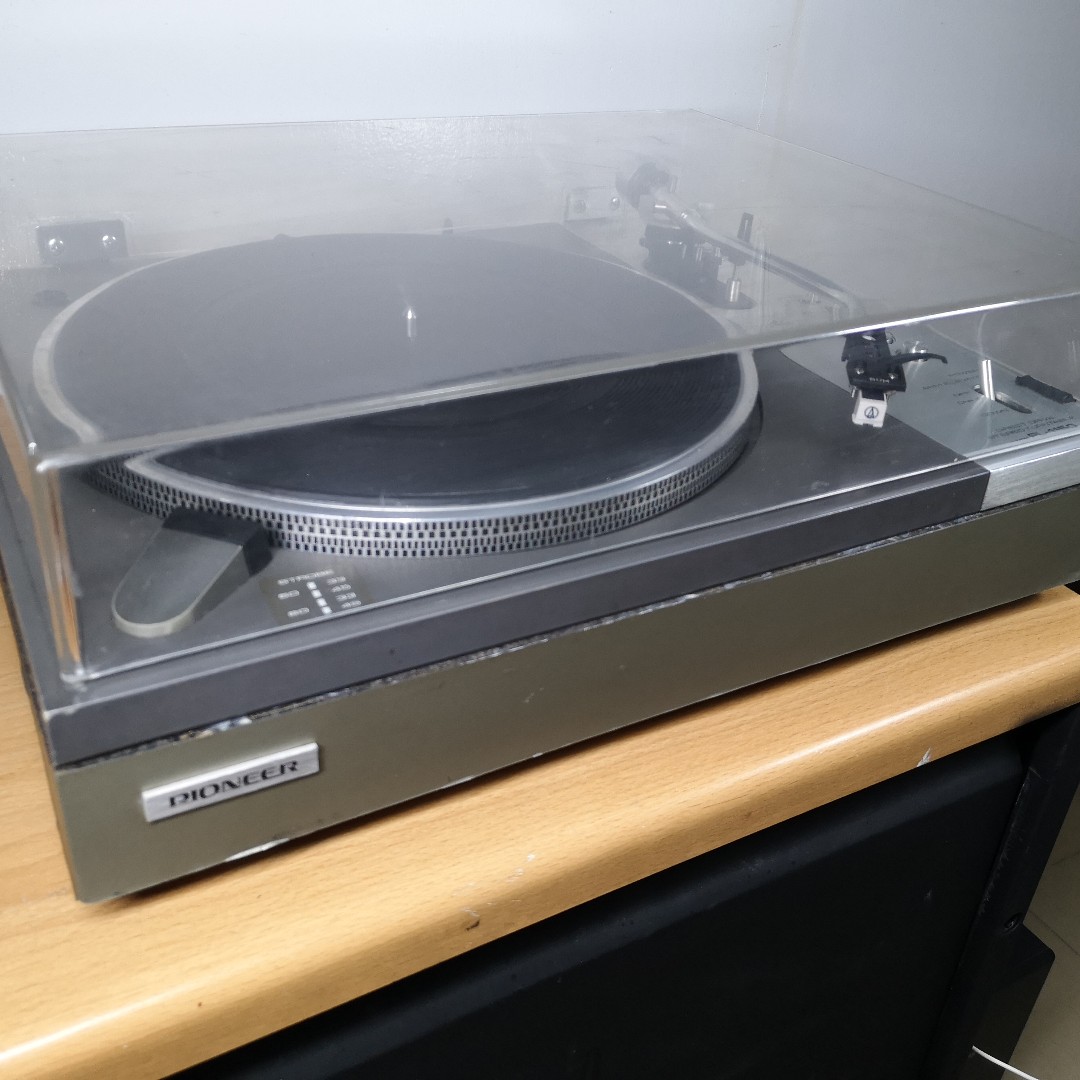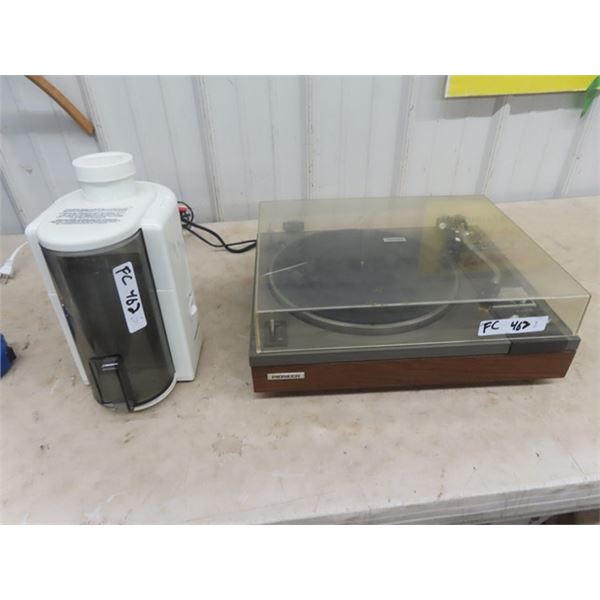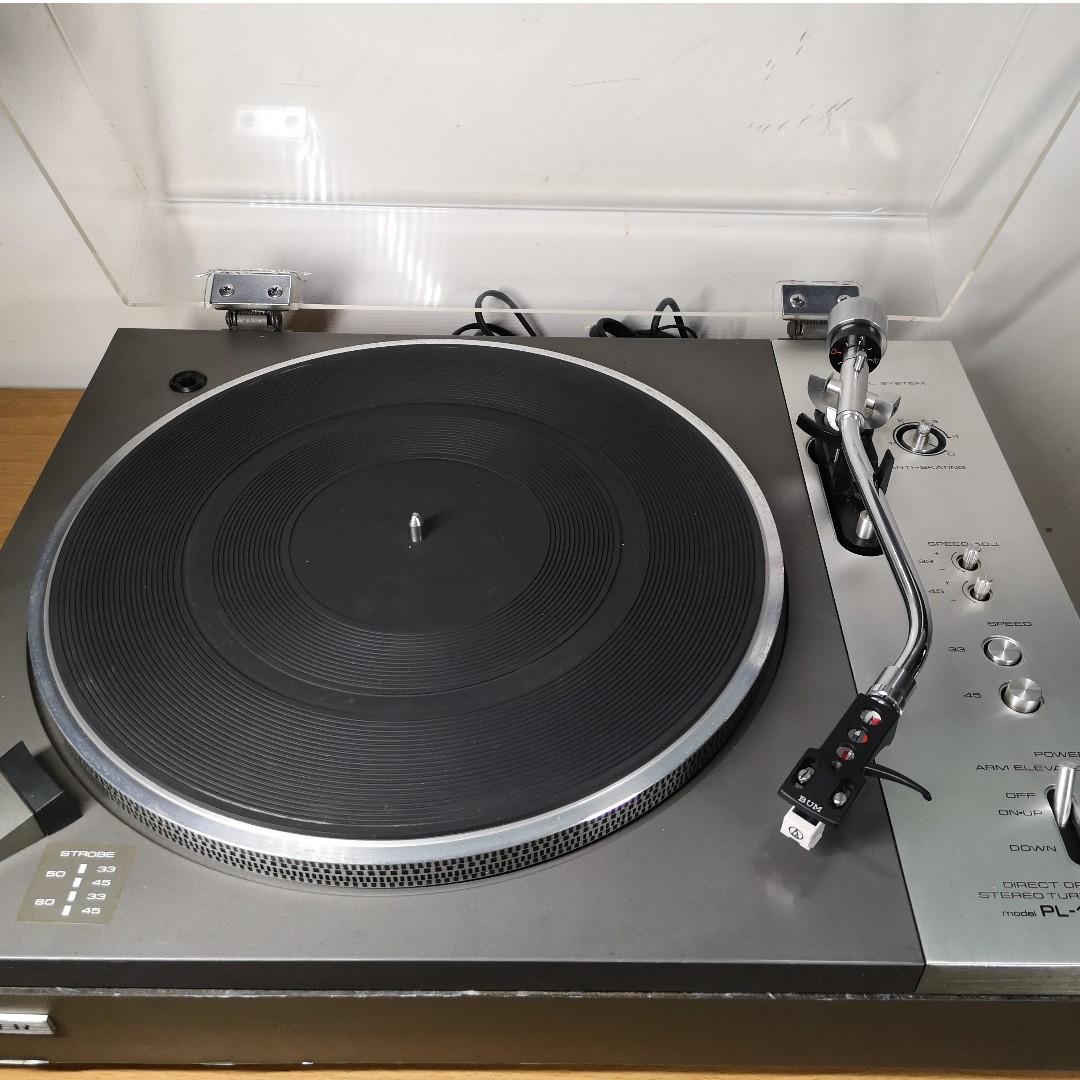Pioneer Pl 1150 Year Of Manufacture For Sale – Similarly, gently used clothing from high-end brands can be found for a fraction of their original retail price. The promise of success in a marketplace driven by capitalism can be an illusion for those who don’t have the resources or opportunities to compete on equal footing. The practice of buying and selling second-hand items has been around for centuries, but in recent years, it has seen a resurgence. Many quality goods are made by artisans or small businesses who take the time to create products that reflect their expertise and passion. This is particularly evident in industries such as furniture, clothing, and electronics. This sense of history and individuality is part of what makes second-hand shopping so appealing. With just a few clicks, consumers can browse through thousands of listings for second-hand items from all over the world. When you buy something made from premium materials, crafted with attention to detail, and tested for reliability, you can expect it to deliver value that surpasses its initial cost. It’s a world where even personal growth, self-actualization, and emotional healing are framed as commodities, available for purchase at any time, but only if you’re willing to pay the price. Whether it’s a handmade leather bag, a vintage watch, or a luxury car, the term “quality” brings with it an expectation — an assurance that the item in question has been crafted with care, attention to detail, and materials that can stand the test of time. These goods, ranging from clothing to furniture, electronics to books, offer people the chance to find items they need or want at a fraction of the cost of new products. It forces us to ask difficult questions about ownership, worth, and the limits of human desire. In this sense, purchasing pre-owned items can be seen as a form of social responsibility, as it helps create a positive impact that extends beyond the individual buyer. Another key benefit of second-hand goods is their positive impact on the environment. They are investments, not just purchases, and their value is often felt long after the original transaction has ended. In addition to individual sales, online marketplaces often feature businesses and professional sellers who specialize in second-hand goods, providing buyers with a curated selection of high-quality items. In some cases, selling second-hand items can be a way to make a significant profit, especially if the items are rare, vintage, or in high demand. A blacksmith might craft a sword, a tailor might stitch a suit, and a potter might mold a vase. Quality goods transcend trends and fleeting fads. In some cases, a business may look profitable but may be hiding significant underlying issues, such as declining sales, ineffective marketing strategies, or employee dissatisfaction.

Pioneer PL1150 Turntable Record Player Used eBay
Up to 70% offwe reviewed every modelfind the best products

Pioneer PL1150 Direct Drive Stereo Turntable, Audio, Other Audio
Up to 70% offwe reviewed every modelfind the best products

Scored a vintage Pioneer PL1150 with Stanton 681EEE cartridge at the
Up to 70% offwe reviewed every modelfind the best products

Pioneer PL1150 record turntable
Up to 70% offwe reviewed every modelfind the best products

SKIVSPELARE, pioneer, PL1150. Övrigt Musikinstrument
Up to 70% offwe reviewed every modelfind the best products

Pioneer PL1150 Turntable Record Player Used eBay
Up to 70% offwe reviewed every modelfind the best products

Pioneer PL 1150 Turntable & Juicer
Up to 70% offwe reviewed every modelfind the best products

Pioneer PL1150 Turntable Record Player Used eBay
Up to 70% offwe reviewed every modelfind the best products

SKIVSPELARE, pioneer, PL1150. Övrigt Musikinstrument
Up to 70% offwe reviewed every modelfind the best products

Pioneer PL1150 Direct Drive Stereo Turntable, Audio, Other Audio
Up to 70% offwe reviewed every modelfind the best products
A car is something that can hold a great deal of sentimental value. A high-quality winter coat, for example, will keep you warm and dry through years of cold weather, offering comfort and protection that a cheaper, mass-produced coat cannot match. With just a few clicks, consumers can browse through thousands of listings for second-hand items from all over the world. It involves an in-depth understanding of the business’s financials, operations, and market position. In this sense, quality is not just about prestige; it’s about making thoughtful choices that contribute to a more sustainable and rewarding lifestyle. For buyers, the process typically starts with identifying a business that aligns with their interests, skills, and goals. With the rise of e-commerce, the accessibility of quality goods for sale has expanded exponentially. In a world that often prioritizes convenience
The notion of a business for sale is one that captures the imagination of many. If the buyer is satisfied with the findings, the next step is usually negotiation. Whether it’s funding education, supporting homelessness services, or providing medical assistance, the money spent in second-hand shops can contribute to making a difference in the lives of others. This sense of history and individuality is part of what makes second-hand shopping so appealing. The idea of buying things that were once owned by someone else is no longer considered taboo or lesser; rather, it has become a lifestyle choice for those who want to make smarter, more ethical purchasing decisions. The democratization of commerce has opened up opportunities for millions of people, giving them the chance to pursue their dreams and create their own paths to success. Everything for sale. It’s about change, opportunity, and the negotiation of value. One of the major environmental concerns with new products is the waste that they often generate at the end of their life cycle. This shift in mindset has contributed to a growing acceptance and even celebration of second-hand shopping, making it a mainstream activity that is not just about saving money but about making more thoughtful and responsible choices. They are intended to last for a limited amount of time, after which they become outdated, broken, or no longer functional. The rise of minimalism and a desire for unique, vintage items has also played a role in the growing popularity of second-hand goods. Yet, at the same time, there’s the promise of new beginnings for both the seller and the buyer.
The marketplace for second-hand items continues to grow, driven by economic, environmental, and cultural factors. For the seller, the goal is often to maximize the value of the business, which requires a clear understanding of the company’s assets, liabilities, and future earning potential. Books, records, and collectibles are also highly sought after in the second-hand market. Manufacturing new items requires energy, raw materials, and natural resources, all of which contribute to environmental degradation. For sale, it seems like a simple phrase, yet it carries with it an array of possibilities, emotions, and decisions that can shape someone’s life. Second-hand goods for sale have become an integral part of today’s economy, a trend that transcends geographic, economic, and cultural boundaries. However, buying a business is not a decision to be taken lightly. In this digital age, it often feels like there’s no such thing as privacy anymore, and that’s because we’ve essentially agreed to sell pieces of ourselves in exchange for recognition, affirmation, or even money. It doesn’t fall apart after a few uses, nor does it need to be replaced after a season. These acts of generosity remind us that there are still things in life that cannot be bought, cannot be sold, and cannot be quantified. Each item was unique, and the quality was immediately apparent to the buyer. Additionally, trends in sustainability and eco-conscious living have contributed to the growth of the second-hand market, as consumers become more aware of the environmental impact of their purchasing decisions. When a person decides to sell something, they might weigh the pros and cons, debating whether it’s the right time or whether it’s really necessary to part with what they’ve had for so long. This sense of connection can also extend to the broader culture of quality goods, where consumers and creators share a commitment to excellence and a desire to preserve the craft and tradition behind these products. For those who enjoy the tactile experience of shopping and the sense of discovery that comes with it, thrift stores offer a personal and immersive way to shop for second-hand items. Social movements and grassroots organizations work tirelessly to provide resources and support to those who need it, often without expecting anything in return. When everything becomes a transaction, we risk losing sight of what truly matters. These platforms have also made it easier for individuals to sell their own pre-owned goods, turning unused or unwanted items into cash. Whether it’s funding education, supporting homelessness services, or providing medical assistance, the money spent in second-hand shops can contribute to making a difference in the lives of others. While the sale of a business can provide a valuable opportunity for both parties involved, it also carries risks.